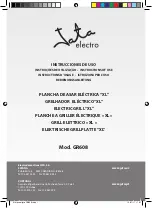
English
20V Lithium-ion Drill/Driver
Operator’s Manual GLCD20CSE
•
Do not force the power tool.
The tool will perform the job better and safer at the feed rate for
which it is designed. forcing the tool could possibly damage the tool and may result in personal injury.
•
Use the correct power tool for the job
.
Don’t force the tool or attachment to do a job for which
it is not designed.
•
Do not use tool if switch does not turn it on or off.
Any tool that cannot be controlled with
the switch is dangerous and must be repaired or replaced by an authorized service center
.
•
Turn power tool off, and disconnect the plug
from the power source and/or battery pack
from the power tool before making any adjustments, changing the accessories, or storing the tools
.
Such
preventive safety measures reduce the risk of an accidental start up which may cause personal injury
.
•
Store idle tool out of reach of children and other inexperienced persons
.
It is
dangerous in the hand of untrained users.
•
Maintain power tools with care
.
Check for proper alignment and binding of moving parts,
component breaks, and any other conditions that may affect the tool’s operation. A guard or any other part that
is damaged must be properly repaired or replaced by an authorized service center to avoid risk of personal
injury.
•
Use recommended accessories
.
using accessories and attachments not recommended by the
manufacturer or intended for use on this type tool may cause damage to the tool or result in personal injury to
the user. Consult the operator’s manual for recommended accessories.
•
Keep cutting tools sharp and clean
.
Properly maintained cutting tools with sharp cutting edges
are less likely to bind and are easier to control
.
•
Feed the workpiece in the correct direction and speed.
feed the workpiece into a
blade, cutter, or abrasive surface against the direction of the cutting tool’s direction of rotation only. Incorrectly
feeding the workpiece in the same direction may cause the workpiece to be thrown out at high speed.
•
Never leave the tool running unattended, turn the power off
.
Do not leave the tool
until it comes to a complete stop.
BATTERY TOOL USE AND CARE
•
Ensure the trigger switch is in the off position before inserting battery pack.
Inserting the battery pack into power tools that have the switch on invites accidents.
•
recharge only with the charger specified by the manufacturer.
A charger that is
suitable for one type of battery pack may create a risk of fire when used with another battery pack.
•
Use battery tools only with specified battery pack
. use of any other battery packs may
create a risk of injury and fire.
•
Avoid storing battery pack in a container with other metal objects such as
nails, coins, clips, keys, screws, or other small metal objects that can make
a connection from one terminal to another
. Always protect the battery terminals when
battery pack is not being used. Connecting the battery terminals together may cause burns or a fire.
•
Under abusive conditions, liquid may be ejected from the batter
y. Avoid contact.
If contact accidentally occurs, flush with water. If liquid contacts eyes, additionally seek medical help. Liquid
ejected from the battery may cause irritation or burns.
•
Battery tools do not need to be plugged into an electrical outlet
, therefore, they are
always in operation condition. Be aware of possible hazards when not using your battery tool or when changing
accessories. following this rule will reduce the risk of electric shock, fire or personal injury.
WArNING:
USE OF THIS TOOL CAN GENErATE AND DISBUrSE DUST Or
OTHEr AIrBOrNE PArTICLES, INCLUDING WOOD DUST, CrYSTALLINE SILICA DUST
AND ASBESTOS. Direct particles away from face and body. Always operate tool in a
well-ventilated area and provide for proper dust removal. Use dust collection system
wherever possible. Exposure to the dust may cause serious and permanent respiratory
or other injury, including silicosis (a serious lung disease), cancer, and death. Avoid
breathing the dust, and avoid prolonged contact with the dust. Allowing dust to get into
your mouth or eyes, or lay on your skin may promote absorption of harmful material.
Always use properly fitting NIOSH/OSHA approved respiratory protection appropriate for
dust exposure, and wash exposed areas with soap and water.
4





































